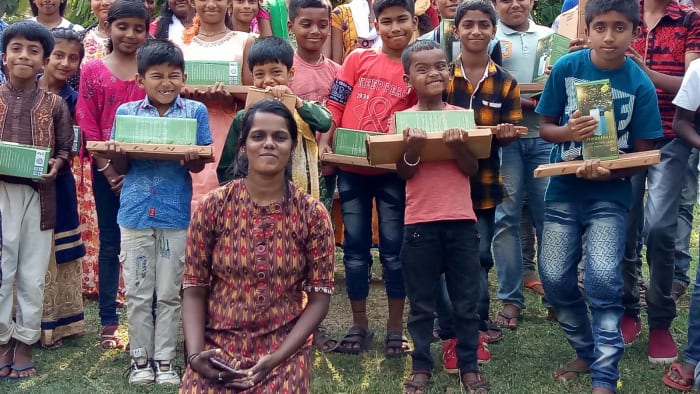 Listen to this article
•
15:34 min
Listen to this article
•
15:34 min
In January 2018 the Sanctuary Nature Foundation’s Mud On Boots project, supported by The Gerry Martin Project (TGMP), put out a call for a local woman to take up a dynamic conservation role at the latter’s farm at Rathnapuri village in rural southwest Karnataka. The idea stemmed from Cara Tejpal who was looking to support grassroots conservationists through the Mud on Boots project. Gerry Martin, snake conservationist and founder of TGMP believed that macho, testosterone-driven snakebite management and mitigation was resulting in poor snake-handling practices, unnecessary bravado, and fear-mongering. He was elated with the idea of involving women in the field of snake conservation.
Marina Juliet, 28, was selected, from a group of aspiring local candidates, to learn the ropes. A year later, when I visit TGMP, I see her, back bent, brows furrowed, crouching over the grass, brandishing her butterfly net across the leafy glade. She is preoccupied with trapping grasshoppers. Marina makes her way around the farm confidently, scrubbing snake enclosures, cooing at the colourful melange of Gerry’s rescues, and always keeping a sharp eye out for little critters.

Children hold on to solar lamps given to them after the successful completion of a plastic-awareness workshop conducted by Marina.
While some of her peers tried to dissuade her from this unusual choice of career, Marina, who is also a wife, and mother to a three-year-old, stubbornly stuck to her “conservationist” guns. “My mother and husband have been very supportive. They know I like being here and that my work means a lot to me,” she says, as she overturns a bottle full of grasshoppers into a tank of bearded dragon lizards. All of Gerry’s exotic rescues were either adopted or rescued from owners who no longer accepted responsibility for their animals.
Off the farm, Marina accompanies Bhuvan, one of TGMP’s trained snake rescuers, on house calls. Together they make an efficient team. While Bhuvan conducts the rescue, Marina supervises the crowd.
Fluent in English, Kannada, and Tamil, Marina conducts regular door-to-door snakebite awareness campaigns in Rathnapuri. “I try to educate people about the common myths related to snakebites, but it is a tough task. Most people still prefer going to quacks instead of hospitals,” sighs Marina. “I tell people how to make their houses snake-proof, what to do if a snake breaks in, but most people act out of fear. If they see a snake, they kill it immediately, venomous or non-venomous.”
Marina also conducts field surveys which help Gerry in his study of the Russell’s viper, one of the “big four” venomous snakes of India. These data collection exercises, Gerry believes, will help in constructing scientific and holistic measures towards human-snake conflict mitigation and conservation.
Navigating snake-bite mitigation can be problematic, and Marina finds that it is the children of the villages who are her best allies. “Children are a lot more open to my awareness activities. They listen, and once they go back home, they convince their parents to make changes,” she reasons.

Beyond snakes, Marina is involved in other community outreach programmes as well. She conducts regular workshops for children, centred on local biodiversity and its protection. I notice a lilt in her tone as she recounts her work with local youth. “I ran multiple plastic awareness workshops for kids. These worked so well that the kids took it upon themselves to do more. They planned their own short skit on plastics and performed it for the village. A number of kids showed up to clean plastic from the village lake as well,” she says.
Chandni Chhabra, director of TGMP, guides Marina in curating workshops and awareness activities. “Marina is incredibly efficient. She takes an initiative and does her homework well. I may help streamline her ideas, but Marina takes care of pretty much everything else. She goes door-to-door, meets parents, gets their permission, and sometimes she even drops the kids home. That is how invested she is,” says Chandni.
Chandni touches upon their future plans of introducing environmental education in government schools in the district. “Marina has gained popularity. Her consistent work has formed the base for introducing a more regular environmental awareness curriculum for village schools. We are also hoping to launch a campaign to mobilise village kids to adopt the village lake. That kind of ownership will help children better understand their natural resources, and motivate them towards protecting them,” says Chandni.
The sound of clapping interrupts our conversation. Nearby, Gerry is conducting a human-snake conflict management training programme for young rescuers from Maharashtra, facilitated by Mud On Boots.

Marina and I hasten towards the clamour. We slink in unnoticed and observe the scene. A cobra, with its hood flanked has backed into a corner. Gerry approaches it confidently while Lisa holds a cloth bag open and ready for the snake. “Arre, how come a girl is rescuing a snake?” Cara mock-jeers from across the floor. Gerry’s response is swift: “Girls rescue snakes, and most often, they do it better than men,” he says, bagging the cobra almost effortlessly. Trust Cara and Gerry to drop a subtle lesson in gender-equality during a snake rescue training session.
Her eyes bright, Marina assesses the scene. She has been through the drill, and lived the training in real time. She has handled non-venomous snakes and even some smaller venomous snakes for a year now, and by all accounts, she has proved to be a quick learner. Training with the big ones is the next step for her.
Marina is part of a 13-member community of grassroots conservationists that Mud On Boots supports both financially and strategically, across different landscapes in India. She is also, the Mud On Boots Projects first woman project leader. Laughter comes easy to Marina, as does an astute perception of her natural world and its complexities. Her guileless demeanour is refreshing, as she quietly works her magic in a man’s world.






